Willy, ON4AVT will be active as 6W7/ON4AVT from Warang, Senegal, 1 February - 12 April 2025.
He will operate on 80 - 10m, SSB, Dgitital modes, and also QO - 100 Satellite.
Recent DX Spots 6W7/ON4AVT
6W7/ON4AVT Log search QSL via home call, ClubLog OQRS.
Ads for direct QSL:
WILLY VANLERBERGHE, VUURKRUISERSLAAN 92, KORTRIJK, 8500, Belgium.
Senegal is an Islamic country and a leading seller of fish and ground nuts
Senegal is one of the African republics located in the westernmost part of the continent and includes desert in the north and humid tropical areas in the south. The country borders states such as Mali, Mauritania, Guinea-Bissau, and the Republic of Guinea. Senegal has an established multiparty system and a fairly developed civil society. Despite the impressive unemployment rate and low standard of living, the republic belongs to the countries of the African continent with stable economy and established democratic model. The capital of Senegal and the largest city of the republic - Dakar - is located on the Cape Verbe peninsula, on the Atlantic Ocean coast. Its location is extremely favorable in terms of transatlantic and European trade. It is this fact that has contributed to Dakar's growth from a small coastal settlement to a major regional port.
 Chameleon, Senegal. Author - Paul Cools.
Chameleon, Senegal. Author - Paul Cools.
The country's first settlements and some historical facts
The first human settlements in the area of present-day Senegal are believed to date back to the Bronze Age, as evidenced by stone burial mounds. From the first to the fourth century, the vast ancient empire of Ghana flourished in West Africa, and in the early 14th century, power in the region passed to the rulers of the Mali Empire, which stretched from Senegal to Nigeria. During this time, due to contact with traders from North Africa, the Islamic religion became widespread in the region.
The first European invasion of present-day Senegal occurred in the 15th century. Portuguese traders established various trade routes along the Gambia and Senegal rivers. The Portuguese transformed the small island of Gore, located near the capital of Senegal, into a major center of the slave trade. The French, British and Dutch, who also wanted their share of the "black" spoils, gradually penetrated the country and joined the slave trade.
In the 18th century, the French strengthened their presence in the coastal territory of Senegal facing the Atlantic Ocean. During the French Revolution, political prisoners were exiled to the newly formed colony. In 1820, the French strengthened their presence in West Africa by establishing a military fort and a French garrison on the Senegal River, as well as the administrative center of Dakar. Some educated Senegalese, mostly from towns founded by the French, were allowed to participate in the French National Assembly. The first black delegate was Blaise Diagne.
After World War II, Senegal organized its own assembly, in which Leopold Senghor was considered one of the most charismatic politicians. He became a significant figure in the national liberation movement, which unfolded in the country in 1959, after the French president Charles de Gaulle united the two colonies of Mali and Senegal and refused to negotiate their independence. Following political conflicts, Senegal was declared a sovereign republic in 1960. The history of independent Senegal has been shaken by the outbreak of separatist conflict in the Casamance region.
 Senegal. Author - Andrew Theophilius.
Senegal. Author - Andrew Theophilius.
Features and subtleties of development of modern Senegal
Despite one of the most stable economies in West Africa, Senegal is still a poor country. After a long period of financial turmoil in recent years, the republic has managed to attract a huge influx of tourists. Traditionally, the country's main export product was peanuts. However, this trend has recently changed and the republic now exports more fish (particularly tuna) than groundnuts to France. The service sector accounts for about 57% of GDP and employment in this sector of the economy continues to grow. More and more tourists are coming to the country, which raises the standards of service and is certainly considered a positive factor for the development of Senegal.
In 1970, like most African countries, the republic borrowed money from the IMF and the International Bank. The money absorption scheme was marred by corruption at the local level. This essentially led to a situation where the country was unable to repay the huge sums of interest accrued on the loans. To alleviate the debt burden, Senegal was classified as a highly indebted poor country at the initiative of the IMF.
 Senegal. Author - Steve Bunting.
Senegal. Author - Steve Bunting.
Senegal is a former French colony where French is the official language of communication. In resort areas English is used, but it is not widely spoken. Approximately 90% of Senegalese are Muslims. The remaining 10% of the population are Christians and people who adhere to traditional pagan African beliefs. Senegal is a rather loyal country and essentially a secular state - a peculiar legacy of the French colonial past. Islam came here from North Africa through the Sahara Desert at the beginning of the 2nd millennium and was quickly adopted by the majority of the local population.

